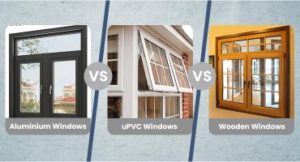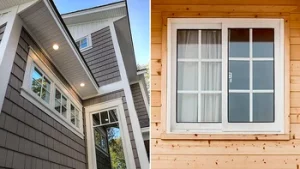Composite Windows vs. The Rest: The Ultimate Window Material Showdown
When it comes to choosing the right window material for your home, homeowners are often confronted with a myriad of options. Each material – whether it be vinyl, wood, aluminum, or composite – carries its own unique strengths and weaknesses. This article takes a deep dive into how composite windows stand up against these materials, considering aspects such as durability, insulation, aesthetics, and cost.

Composite vs. Vinyl Windows
Contents
Vinyl windows are known for their low maintenance and affordability, making them a popular choice among many homeowners. They offer reasonable insulation and are resistant to rot and insects. However, they have limitations. Vinyl windows can warp or crack in extreme temperatures, which can lead to air leakage and decreased energy efficiency. Unlike vinyl windows, composite windows are made from a blend of materials that give them superior strength and durability. They can withstand severe weather conditions without warping or cracking, making them a better choice for long-term energy efficiency.

Composite vs. Wood Windows
Wood windows are praised for their natural beauty and superior insulation properties. However, they require regular maintenance to prevent decay and are more susceptible to rot, insects, and warping. Composite windows, on the other hand, are engineered to mimic the look and feel of traditional wood windows, but without the associated maintenance hassles. They resist rot and insects, require minimal upkeep, and can come in a variety of colors and finishes, making them a great low-maintenance alternative to wooden windows.
Composite vs. Aluminum Windows
Aluminum windows are durable and resistant to rot and insects. They’re a common choice for commercial buildings due to their strength. However, they fall short in terms of insulation, leading to higher energy costs for the homeowner. In contrast, composite windows offer the best of both worlds: they are extremely durable like aluminum but also provide better insulation, reducing energy costs. Unlike aluminum windows, composite windows can also be customized to fit the aesthetics of your home, offering a wide variety of styles and finishes.
Composite Windows: The Best of All Worlds
When it comes to choosing new windows for your home, composite windows offer a compelling case. They combine the strength of vinyl and aluminum with the aesthetics of wood, offering homeowners a window replacement that is durable, energy-efficient, and beautiful.
Composite windows may come at a slightly higher cost than their vinyl or aluminum counterparts, but their long-term benefits, including reduced energy bills and increased home value, can offset the initial expense. Additionally, they can save homeowners time and money in maintenance costs, as they are designed to withstand harsh weather conditions and do not rot or warp.
In conclusion, when comparing composite windows vs. other materials, composite windows emerge as a clear winner. They provide the durability of vinyl and aluminum, the beauty of wood, and superior energy efficiency, making them an excellent choice for any homeowner looking to replace outdated windows.
So, when it’s time to choose windows for your home, don’t compromise. Go for composite windows, which offer the best in terms of durability, energy efficiency, and aesthetics. Choosing the right window material could significantly improve your home’s comfort, energy efficiency, and curb appeal.

